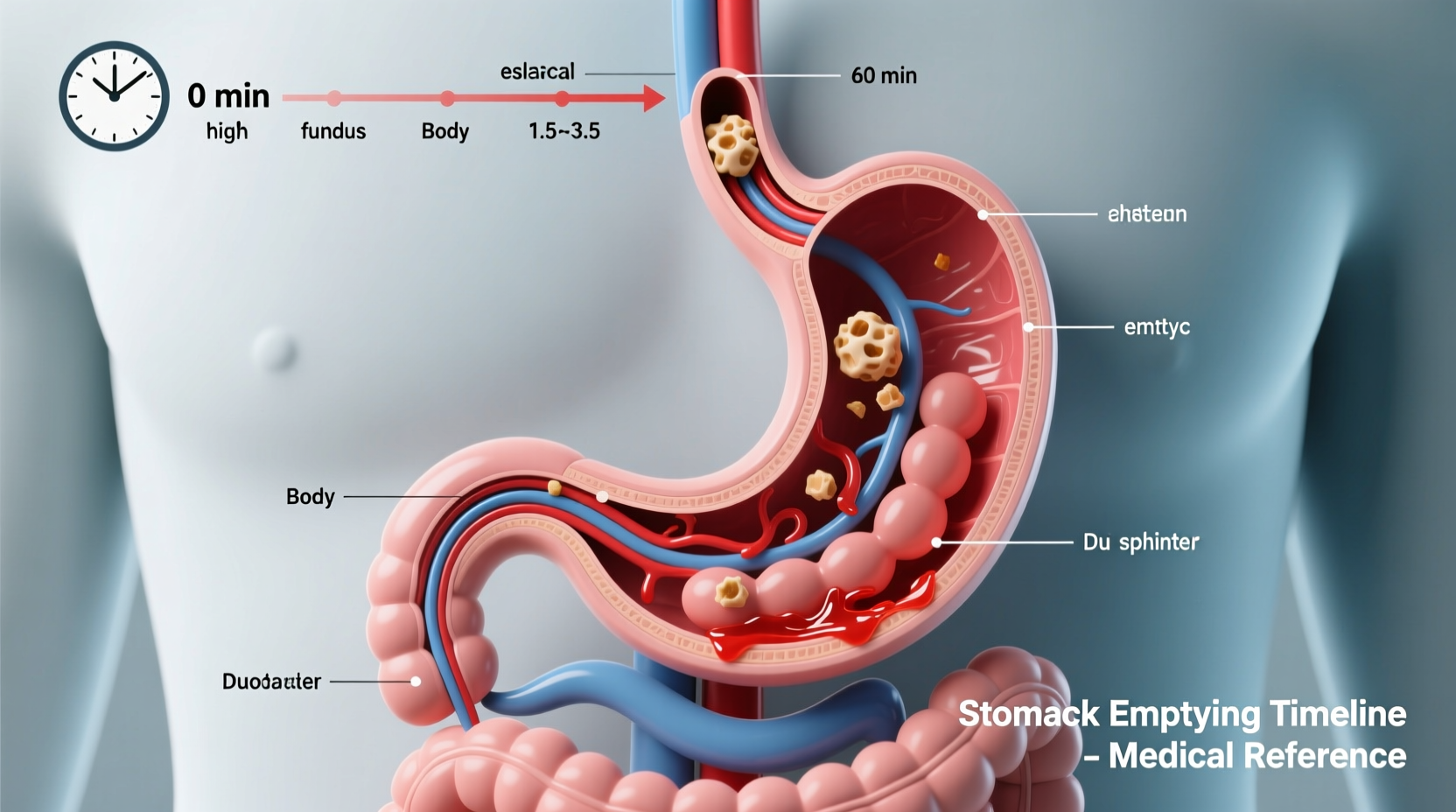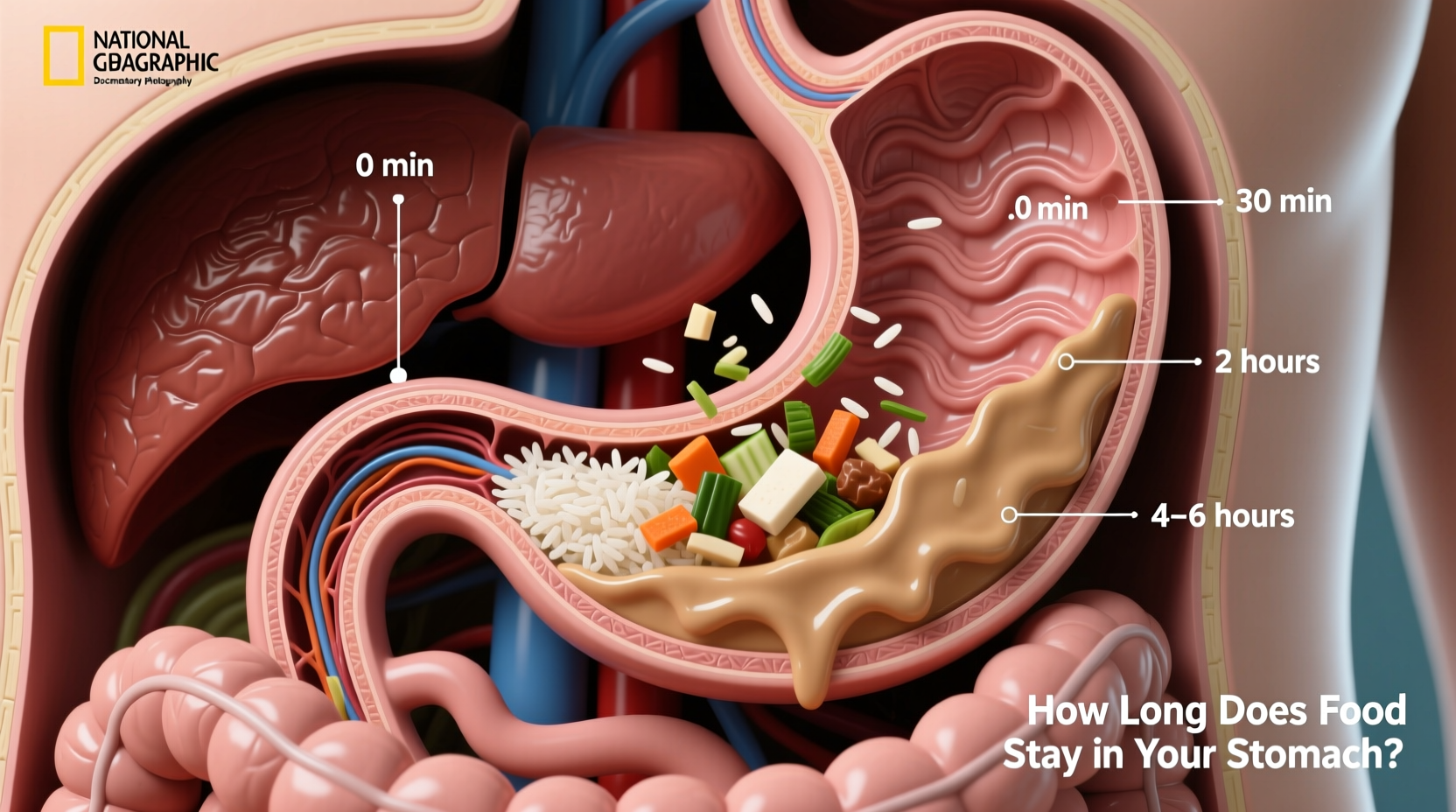Ever wonder why that light salad leaves you hungry in a few hours while a hearty steak dinner keeps you full for half the day? Understanding gastric emptying times isn't just academic—it directly impacts your meal planning, digestive comfort, and nutrient absorption. This guide reveals precisely how long food stays in your stomach, the science behind digestion timing, and practical strategies to optimize your eating patterns based on your body's natural rhythms.
The Digestive Timeline: What Happens After You Eat
When food enters your stomach, a precisely coordinated process begins. The stomach's muscular walls churn food while gastric juices break it down into a semi-liquid mixture called chyme. This process isn't uniform—different nutrients trigger distinct digestive responses that determine how quickly your stomach empties.

Key Factors That Determine Stomach Emptying Time
Your stomach doesn't treat all foods equally. The composition of your meal dramatically affects how long it remains for processing before moving to the small intestine.
Food Composition Matters Most
Carbohydrates exit the stomach fastest, followed by proteins, with fats significantly slowing the process. This explains why that greasy burger keeps you feeling full longer than a simple fruit smoothie.
| Food Type | Average Stomach Emptying Time | Key Influencing Factors |
|---|---|---|
| Water & Clear Liquids | 15-30 minutes | Temperature, hydration status |
| Fruit Juices & Smoothies | 30-60 minutes | Sugar content, fiber amount |
| Simple Carbohydrates | 1-2 hours | Refined vs. whole grain |
| Proteins | 2-3 hours | Lean vs. fatty cuts, cooking method |
| Fats & Oils | 3-5 hours | Type of fat, meal combination |
This comparative data aligns with research from the National Institute of Diabetes and Digestive and Kidney Diseases, which confirms that meal composition significantly impacts gastric emptying rates through hormonal signaling pathways.
Individual Factors That Alter Digestion Timing
Beyond food composition, several personal factors influence how long food remains in your stomach:
- Meal size: Larger meals trigger the ileal brake mechanism, slowing stomach emptying to prevent intestinal overload
- Hydration status: Dehydration reduces gastric motility, prolonging digestion time
- Age: Stomach emptying slows by approximately 15% between ages 20-70 according to NIH research
- Physical activity: Moderate exercise after eating accelerates gastric emptying by 20-30%
- Medical conditions: Diabetes, gastroparesis, and thyroid disorders significantly alter normal digestion patterns
Practical Applications: Using Digestion Timing to Your Advantage
Understanding stomach emptying times empowers you to make strategic eating decisions:
Optimizing Meal Timing for Energy and Performance
Eat complex carbohydrates 2-3 hours before exercise for sustained energy release. For quick energy before a workout, choose simple carbs 30-60 minutes beforehand. Post-exercise, combine protein and carbs within 45 minutes when your stomach has sufficiently emptied to maximize nutrient absorption.
Managing Digestive Discomfort
If you experience bloating or discomfort, consider the gastric emptying timeline. Avoid large, high-fat meals before bedtime since food may still be processing when you lie down, increasing reflux risk. For acid reflux sufferers, allow 3-4 hours between your last meal and lying down.
Special Considerations for Medical Procedures
Medical guidelines typically require 6-8 hours of fasting before procedures because while most food leaves the stomach in 4-5 hours, complete gastric emptying takes longer. The American Society of Anesthesiologists bases pre-surgery fasting guidelines on gastric emptying research to prevent aspiration risks.
When Digestion Times Signal Health Concerns
Naturally variable digestion times become concerning when they fall outside typical ranges:
- Gastroparesis: When food remains in the stomach significantly longer than 5 hours, causing nausea, bloating, and erratic blood sugar
- Rapid gastric emptying: When food passes too quickly (less than 1 hour), potentially causing dumping syndrome with symptoms like dizziness and sweating
Consult a healthcare provider if you consistently experience symptoms like persistent fullness after small meals, unexplained vomiting, or dramatic changes in digestion patterns that don't align with your eating habits.
Optimizing Your Digestive Health Daily
You can support healthy stomach emptying through simple daily practices:
- Chew thoroughly to reduce the stomach's mechanical workload
- Space meals 3-4 hours apart to allow complete gastric emptying cycles
- Stay hydrated with water between meals (not during) to avoid diluting gastric juices
- Include moderate fiber from whole foods to regulate digestion speed
- Engage in light activity like walking after meals to stimulate gastric motility











 浙公网安备
33010002000092号
浙公网安备
33010002000092号 浙B2-20120091-4
浙B2-20120091-4